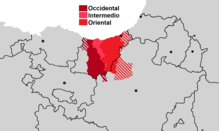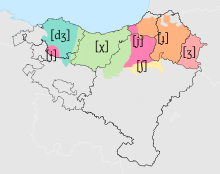Gipuzkoan dialect
Gipuzkoan (Gipuzkera in Basque, Guipuzcoano in Spanish) is a dialect of the Basque language spoken mainly in the province of Gipuzkoa in Basque Country but also in a small part of Navarre. It is a central dialect, spoken in the central and eastern part of Gipuzkoa. In the traditional dialectal classification of the language based on research carried out by Lucien Bonaparte in the 19th century, the varieties of the valleys Sakana and Burunda are also included in Gipuzkoan, while this approach has been disputed by modern Basque linguists.
| Gipuzkoan | |
|---|---|
| Gipuzkera | |
| Native to | Spain |
| Region | Gipuzkoa, Navarre |
| Language codes | |
| ISO 639-3 | – |
| Glottolog | guip1235[1] |
 | |
Area
Gipuzkoan is spoken not in all of Gipuzkoan but in the area between the Deba River and the River Oiartzun. The strip of Gipuzkoa from Leintz-Gatzaga to Elgoibar is part of the Biscayan (Western) dialect area, and the River Oiartzun flowing past Errenteria outlines the border with the Upper Navarrese dialect. However, borders between Gipuzkoan and High Navarrese are gradually disappearing, as Standard Basque is beginning to blur the differences among traditional dialects, especially for younger Basques.
Features

Some of the features of Gipuzkoan, as perceived by speakers of other dialect, are the following:
- The grapheme j, which is highly variable among Basque dialects, is generally [x] (e.g. [xaˈkin] vs [ʝaˈkin], jakin).
- The verb for 'to go' is pronounced jun ([ˈxun]), as opposed to the general joan ([ˈʝoan]).
- The axiliary verb forms are "det, dek, dezu" etc., as opposed to general Basque "dut" (Biscayan "dot").
- Verb infinitives end with" -tu", (bizitu, bialdu, etc.), frequent in central dialects, as opposed to the older "-i (bizi, bi(d)ali etc.).
- The root ending of nouns "-a" is often interpreted as an article and dropped in indefinite phrases: gauz bat 'one thing' vs gauza bat.
- The sibilant allophone "tx" at the beginning of words replaces the general fricative "z": txulo vs zulo, txuri vs zuri.
Variants
Gipuzkoan had four main variants:
- The Beterri variant (from the area surrounding Tolosa, towards San Sebastián).
- The Goierri variant.
- The Urola variant (from Zarautz to Mutriku).
- Navarrese Gipuzkoan (Burunda, Echarri-Aranaz).
Historical role
Gipuzkoan is one of the four dialects known as the literary dialects of Basque (Biscayan, Lapurdian, Souletin and Gipuzkoan). It was used in Basque literature from the 17th century onward, but like Souletin and Biscayan, it had only a minor role because of the Lapurdian dialect's dominance. That was because the centre of Basque literary production was in Labourd from the 16th century to most of the 18th century.
Source of Standard Basque
Gipuzkoan vocabulary was used as the main source for Standard Basque, the standardised dialect of Basque that is used in schools and the media.
See also
- Basque dialects
- Batua (Standard Basque)
- Euskaltzaindia, the Royal Academy of the Basque Language
References
- Hammarström, Harald; Forkel, Robert; Haspelmath, Martin, eds. (2017). "Guipuzcoan". Glottolog 3.0. Jena, Germany: Max Planck Institute for the Science of Human History.